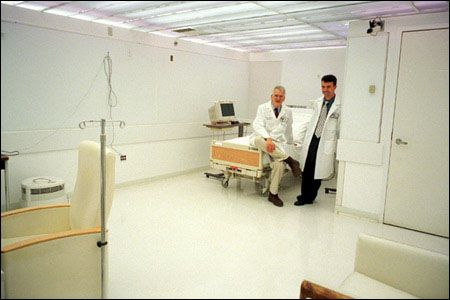Overworked interns prone to medical errors
Lighter schedules reduce serious errors 36 percent

Every day, in hospitals all over the country, biology clashes with medicine. Biology demands sleep; medicine dictates long hours without it.
Interns at an intensive care unit in a large Boston teaching hospital typically work 77 to 81 hours per week, with up to 34 consecutive hours without sleep. That’s a heroic schedule, but one demanded by the culture of medicine and considered a sign of dedication to patients. But is this good for patients?
No, concludes a study by researchers at the Harvard Medical School, who compared the performance of first-year interns working a traditional schedule or a considerably lighter one. On the traditional schedule, interns were on duty an average of 85 hours per week, including two extended shifts lasting 30 consecutive hours or more. Then they switched to so-called intervention schedules, where they enjoyed 20 hours a week less work, about six hours a week more sleep, and continuous shifts of “only” 16 hours.
The result was dramatic.
“Interns made 36 percent more serious medical errors during a traditional work schedule than during an intervention schedule that eliminated extended work shifts,” notes Charles Czeisler, Baldino Professor of Sleep Medicine. “These included 21 percent more serious medication errors and 5.6 times as many serious diagnostic errors.”
The research was done at Brigham and Women’s Hospital. Czeisler and his colleagues describe the results in two articles published in the Oct. 28 issue of the New England Journal of Medicine. One of the errors they write about involved an intern who was about to insert a tube into the left side of a patient’s chest. The tube was supposed to be inserted in the right side. Fortunately, a senior resident entered the room in time for the mistake to be corrected.
In another incident, an intern reported that a patient with congestive heart failure was in stable condition. But a nurse found that the patient was overloaded with fluid and having trouble breathing.
Other intern errors resulted in one patient developing a rapid heart rate for a protracted period of time, and another developed an abnormally low heart rate due to an overdose of a tranquilizer.
“All of these errors had the potential to cause serious harm,” Czeisler says. “Fortunately, most of the errors were discovered or did not result in detectable harm to the patient.”
“If the most serious of the errors had not been intercepted by the hospital staff, some patients would have been seriously injured,” admits Christopher Landrigan, lead author of one of the journal reports. “Two patients did die from hospital infections, but these deaths were not due to errors on the part of interns. Death rates were normal for intensive care units, and there was no difference in these rates between teams on traditional schedules and those on the lighter schedule.”
Sleep up, errors down
Participating in the study was tough on the 24 interns. They were constantly watched; doctors followed them continuously, day and night. Even bedtime gave no freedom from surveillance. They wore electrodes on their heads and faces to reveal if they were awake or asleep and whether the sleep was light or deep.
Other research has revealed that a single sleepless night reduces performance to a level similar to a blood alcohol level of 0.1 percent, high enough to get you arrested for drunken driving. Such short-term sleep deprivation is compounded by not getting enough sleep over weeks and even months, something that is a matter of fact in an interns’ traditional schedule, Landrigan points out.
Allowing the interns more sleep should also decrease the problem of sleep inertia, the familiar grogginess felt right after waking from a deep sleep. The lighter schedule also was designed to reduce the equivalent of jet lag, or having the normal day-night cycle scrambled. Those slated to pull overnighters were advised to take midafternoon naps before going to work. On days where schedules called for a continuous16-hour shift, interns could sleep afterward until they felt ready to get up.
Cutting shifts from 30 to 16 hours still leaves interns with a long day by ordinary standards. It’s the equivalent of working from 8 a.m. to midnight. And crammed into those hours are hundreds of different tasks.
An intern’s day may demand 200 actions that must be taken in the next 24 hours. “Most of those in the study got it right 99.5 percent of the time,” Czeisler notes. “It was the other half percent that we are concerned with. Those who worked 30 continuous hours in intensive care units, where the sickest patients are, nodded off twice as often while working at night and made many more serious errors than those whose continuous shifts lasted no more than 16 hours.”
Reducing biological costs
Last year, the group that sets duty hours for interns and residents, the Accreditation Council for Graduate Medical Education, limited those hours to 80 per week. But this standard still allows unbroken stretches of 30 hours.
Czeisler would like to see intensive-care-unit limits of 12 hours. “The biological costs of foregoing sleep are well known,” he says. “They include slowed reaction times, impaired judgment and learning, and lapses of attention. It’s time to apply this knowledge to the traditions of medicine. When Harvard took the first step to do this, our studies showed that the rates of serious medical errors in two intensive care units were lowered significantly. In particular, rates of serious diagnostic errors dropped fivefold.”
Czeisler’s colleagues Steven Lockley and Christopher Landrigan point out that their results have “important implications for health policy, since more than 100,000 physicians are currently in training in the United States.” They further note that, “our findings may apply not only to residents working in critical care units but also to more senior residents, physicians, nurses and others, including surgeons.”




